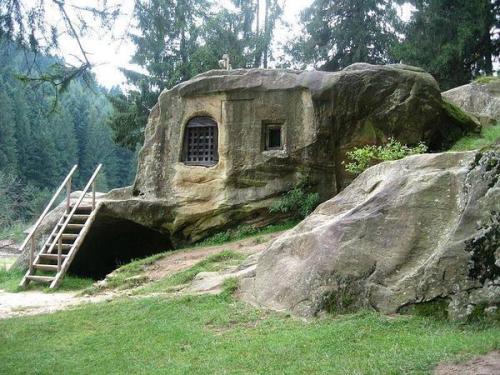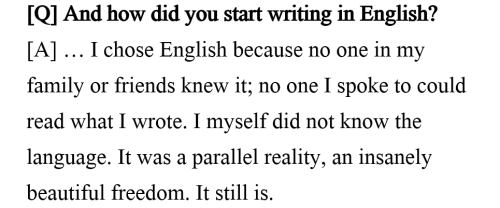In Short, How Would You Define 'gothic' ? For Someone Who Has Read Some Very Basic Gothic Stuff But Is
In short, how would you define 'gothic' ? for someone who has read some very basic gothic stuff but is trying to arrive at a good overarching descriptor.
This is difficult— I have yet to read a definition that encompasses the Gothic genre. Patrick Kennedy defines it as “writing that employs dark and picturesque scenery, startling and melodramatic narrative devices, and an overall atmosphere of exoticism, mystery, fear, and dread” but this doesn’t ring quite true— yes, the Gothic deals with dread, but it does not always have dark and picturesque scenery, and it does not always rely on exoticism. James Greaver and Ginna Wilkerson define it as “a style of writing that is characterized by elements of fear, horror, death, and gloom, as well as romantic elements, such as nature, individuality, and very high emotion” and while this comes closer, it doesn’t necessarily encompass all of Gothic. Enclyclopedia.com defines it as “a literary movement that focused on ruin, decay, death, terror, and chaos, and privileged irrationality and passion over rationality and reason, grew in response to the historical, sociological, psychological, and political contexts of the late eighteenth and early nineteenth centuries” which isn’t wrong, but also is missing slightly.
So, I can’t really offer a good defintion, but I can tell you about issues the Gothic is concerned with.
the sublime : a combination of awe and terror. Poets.org has a good article on this concept. and in relation to the sublime:
the unexplainable : the Gothic was very much a response to the enlightenment’s attempt to realise and create explanation— the questions the Gothic poses are Are there things beyond science? How do we react to what cannot be explained with scientific and logical means?
excess : emotion and stakes are high. Consider the impassioned love confessions of Wuthering Heights (“You said I killed you— haunt me, then!”) the debauchery and decadence of Dorian Gray (see also: the decadent movement, which was intimately related to the Gothic). Gothic lovers are lovers who often have potential to destroy one another because of their excess of emotion and desire. It’s like opera: everything is heightened by the experience of the sublime surroundings. The human spirit is expanded, often until it bursts.
boundaries and trangression/violation of those boundaries : boundaries of death, boundaries of gender, boundaries of social class, boundaries of race, boundaries of desire, boundaries of mind and reality. In Frankenstein this might be Victor creating the creature; it may be Carmilla’s lesbian (and thus transgressive) desire for Laura: it may be Will Graham’s desire to enact violence as an independent agent rather than as an agent of the law. I mentioned the sublime before, and I want to note that the sublime itself is transgressive: it’s beyond normal human experience. and in this regard it’s also about:
setting : setting is never just setting: it’s also psychological, a reflection of the characters. Brontë compares Catherine to the landscape she inhabits;
the horror of imagination and the psychological interior : Emily Dickinson: “one need not be a chamber to be haunted”. Consider Freud’s idea of the unconscious mind. I don’t know if you’ve seen Stalker (a film by Andrei Tarkovsky) but one plot element it has is called the “Room” which grants the wishes of anyone who sets food inside. but it’s not about what you actually wish for— it’s about your innermost desire, one you may not even be conscious of. There’s the story of a man who went with his brother to the room, and his brother died along the way. And he entered the room, and then he inherited a lot of money, which led him to commit suicide. Why? Because it revealed that his greatest desire was not to bring back his brother, but to be wealthy. The horror of that realization compelled him to kill himself. The Gothic is very much about people confronting their interiors: the horrors they have committed (willingly or unwillingly), the horrors their family committed, the horrors they discover that reveal the darkness someone close to them (Bluebeard), the horrors of history (consider Toni Morrison’s Beloved), etc. The interior is often the historical, and the plot of Gothic novels can almost only end when it is confronted.
As for the difference between the Gothic and Horror, horror often deals with a concrete terror. In Gothic literature, the monster may be real, but the monster is not the sole source of terror: the source of terror is also often psychological. Horror is resolved by confronting an outside force: the Gothic is resolved by confronting ourselves.
More Posts from Hopelessromantism and Others

“You’ve felt it, haven’t you? Those feelings that seem to get so big in your chest, like something is so beautiful it aches?”
— Heather Anastasiu, Glitch (via thequotejournals)

House carved into a stone by a 15th century Romanian monk
Damn.....
“Life is too short for shitty sex and bad relationships. So go find someone who fucks you right and treats you how you deserve to be treated.”
— (via hplyrikz)
Clear your mind here
(via hplyrikz)

And today I did my hair,went to the church
Met my parents after a month,brought home some duck eggs and some herbs.
Cleaned my tub and washed my breasts.
My plants were green and my apple was not rotten today.
White linen sheets and dirty curtains still made my bed.
I did all the things but didn't wait for someone again.

wind in my hair, i was there
“Spring: You had sunset eyes; beautiful to stare at, but they told the story of a life that had been steadily moving downward. Summer: Dusk melted into your smile and watched while happiness became an ocean for our paper hearts to drown in. Fall: There are never enough letters to house broken hearts, but we still break glasses to borrow emotion for self combustion to write a new lullaby. Winter: My sadness tastes a lot like your name tonight.”
— How to lose yourself in a year. (via teacup12)
I'm on Instagram as @hopeless_romantism__. Install the app to follow my photos and videos. https://www.instagram.com/invites/contact/?i=clhzsa5e7436&utm_content=lkepbq4

You look around the lecture hall and notice all the other students have fallen asleep. You look towards the lecturer, who has now stopped talking and is staring straight at you. “I don’t know how you’re still awake, but I guess we do this the hard way.” He says before pulling out a sword.

Still Dancing: An Interview With Ilya Kaminsky by Garth Greenwell
-
 molarcupcake reblogged this · 3 months ago
molarcupcake reblogged this · 3 months ago -
 molarcupcake liked this · 3 months ago
molarcupcake liked this · 3 months ago -
 zozgreenery liked this · 3 months ago
zozgreenery liked this · 3 months ago -
 ianthewife liked this · 3 months ago
ianthewife liked this · 3 months ago -
 lights-at-night reblogged this · 3 months ago
lights-at-night reblogged this · 3 months ago -
 ohgodcast-official liked this · 3 months ago
ohgodcast-official liked this · 3 months ago -
 fancyhalloran liked this · 3 months ago
fancyhalloran liked this · 3 months ago -
 z3ncat reblogged this · 3 months ago
z3ncat reblogged this · 3 months ago -
 finalgirlart liked this · 3 months ago
finalgirlart liked this · 3 months ago -
 cosmichorrorlesbians reblogged this · 3 months ago
cosmichorrorlesbians reblogged this · 3 months ago -
 cosmichorrorlesbians liked this · 3 months ago
cosmichorrorlesbians liked this · 3 months ago -
 sirghostheart reblogged this · 3 months ago
sirghostheart reblogged this · 3 months ago -
 huntingblueskies liked this · 5 months ago
huntingblueskies liked this · 5 months ago -
 speedracersaysfuckcapitalism reblogged this · 6 months ago
speedracersaysfuckcapitalism reblogged this · 6 months ago -
 kdreader02 liked this · 6 months ago
kdreader02 liked this · 6 months ago -
 driftingjazzbard liked this · 6 months ago
driftingjazzbard liked this · 6 months ago -
 achromatis liked this · 6 months ago
achromatis liked this · 6 months ago -
 legardien liked this · 6 months ago
legardien liked this · 6 months ago -
 hiswrlds liked this · 6 months ago
hiswrlds liked this · 6 months ago -
 dnangelic liked this · 6 months ago
dnangelic liked this · 6 months ago -
 dnangelic reblogged this · 6 months ago
dnangelic reblogged this · 6 months ago -
 galaxieswithinuss liked this · 8 months ago
galaxieswithinuss liked this · 8 months ago -
 s-aint-elmo liked this · 8 months ago
s-aint-elmo liked this · 8 months ago -
 parodytoken reblogged this · 8 months ago
parodytoken reblogged this · 8 months ago -
 b00kworm liked this · 10 months ago
b00kworm liked this · 10 months ago -
 whatinthecat liked this · 10 months ago
whatinthecat liked this · 10 months ago -
 fembymartyr liked this · 11 months ago
fembymartyr liked this · 11 months ago -
 keeperofsecretsunderthehill liked this · 11 months ago
keeperofsecretsunderthehill liked this · 11 months ago -
 sirghostheart liked this · 11 months ago
sirghostheart liked this · 11 months ago -
 lookingatcloudssong reblogged this · 11 months ago
lookingatcloudssong reblogged this · 11 months ago -
 e-litlist reblogged this · 1 year ago
e-litlist reblogged this · 1 year ago -
 silverthroatednightingale reblogged this · 1 year ago
silverthroatednightingale reblogged this · 1 year ago -
 silverthroatednightingale liked this · 1 year ago
silverthroatednightingale liked this · 1 year ago -
 175203 liked this · 1 year ago
175203 liked this · 1 year ago -
 lemoncortado reblogged this · 1 year ago
lemoncortado reblogged this · 1 year ago -
 rosalinecapulet liked this · 1 year ago
rosalinecapulet liked this · 1 year ago -
 haidoretreat liked this · 1 year ago
haidoretreat liked this · 1 year ago -
 xonference reblogged this · 1 year ago
xonference reblogged this · 1 year ago -
 evillady6 liked this · 1 year ago
evillady6 liked this · 1 year ago -
 herehaveafandom reblogged this · 1 year ago
herehaveafandom reblogged this · 1 year ago -
 wasu-rena-gusa liked this · 1 year ago
wasu-rena-gusa liked this · 1 year ago -
 your-angels liked this · 2 years ago
your-angels liked this · 2 years ago -
 machiavellianjane liked this · 2 years ago
machiavellianjane liked this · 2 years ago -
 glossrven liked this · 2 years ago
glossrven liked this · 2 years ago -
 fourorfivemovements reblogged this · 2 years ago
fourorfivemovements reblogged this · 2 years ago -
 notosct liked this · 2 years ago
notosct liked this · 2 years ago
